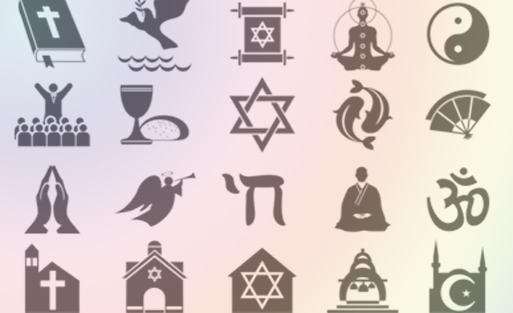
By Hsin-Yi Lo. This article is part of our February 2013 focus on Religion and Human Rights.
Article 18, The Universal Declaration of Human Rights:
Everyone has the right to freedom of thought, conscience and religion; this right includes freedom to change his religion or belief, and freedom, either alone or in community with others and in public or private, to manifest his religion or belief in teaching, practice, worship and observance.
According to the 2011 National Census, Christianity remains as the largest religious group in Australia, while other groups – Hinduism (1.3 per cent), Islam (2.2 per cent) and Buddhism (2.5 per cent) – make up the larger portion for non-Christian groups. Although our society is blessed with many diverse faiths, experience has shown that religious leaders use their position to denounce other faiths.
Some religious philosophies may conflict with others, but it is important to remember all faiths have their unique values and customs, and many people regard religion as an integral part of their lives. To sustain a harmonious society, a multi-faith society should be strongly supported.
Religious leaders discriminating against other religions
In 2010, Reverend Fred Nile, the leader of the Christian Democratic Party, introduced a Bill to parliament to ban the burqa, following in the footsteps of France. Nile claimed the burqa “is not part of our culture and tradition” and that is a symbol of oppression. Although he was not successful, this is an example where a religious leader exercised political influence and power in an attempt to discourage other religious practices.
In November 2012, a plan was proposed at Doveton in Melbourne to construct an Afghan mosque – the Omar Farooq Mosque – next to Catch the Fire Ministries’ church, which was also planned for the area. Pastor Danny Nalliah of Catch the Fire Ministries was aggressively opposed to the mosque; he caustically said “frankly, I don’t think we can live side by side with a mosque next to us based on what’s happening in Europe”. Mr Nalliah is notorious for his anti-Islam attitude; in 2002 he was sued by the Islamic Council of Victoria for religious vilification.
President of the Afghan-Australian Association of Victoria, Khaliq Fazal, accused Mr Nalliah and his church of disseminating anti-Islam messages to neighbours. The Deputy Mayor of the City of Casey, Sam Aziz, supported Mr Nalliah’s claims.
In January 2013, Monash University’s Monash Mosque, planned renovations to accommodate its growing numbers of followers. This was met with scathing remarks from the Uniting Church Group, which is located next to the mosque. Richard Farrell, the Chairman of the Monash Uniting Church congregation, commented “in effect a mosque is a training ground for religious moderates at one end of the scale and religious fanatics at the other end”.
Reverend Hoon You, the Uniting Church minister of the Monash Congregation accused Islam of encouraging violence and inferred the Monash Mosque had hidden agendas. ”The meaning of ‘mosque’ is ‘submission’, so when Islam invades European countries and they dominate, the first thing they do is build the mosque,” he said. ”We do not know what the Muslim community is planning, so we would love to hear more on their reasons for developing the mosque, instead of their prayer room, which they already have”.
Of course, this is not indicative to all Christian groups, but the above examples exemplify how some religious leaders have used their influential status to indict smaller religious groups. Anti-Islam sentiments expressed by some Christian leaders have been under the spotlight in Australia in recent times. While the reasons to this is a matter of opinion, some believe it was former Prime Minister John Howard’s “war on terror” policy that has, in some way, prompted negative stereotypes of Islam. Another possible explanation is some individual religious leaders, such as Pastor Nalliah, have an assertive view against Islam and its teachings. He once said “we either can follow the Koran and follow Islamic sharia law and be slaves in this nation or follow the Bible and be a free and democratic society”. Pastor Nalliah has even set up a political party, Rise Up Australia Party, advocating to limit Muslim migration.
More support for a multi-faith society
Religion is regarded as a contentious issue by many Australians, and many would rather avoid discussing it. However, evading the topic will only perpetuate a reluctance to be more open to and learn about different religions’ customs and philosophies.
Almost one quarter of Australians are born overseas, and they take with them their faiths. Faith is linked with personal values and morals; many people use their religion for guidance through life, challenges and in their understanding of the world. We need to acknowledge that not all Australians subscribe to the same faith, and persecuting a particular faith (as per the examples provided), would lead to further misunderstandings, ignorance and conflict. Religious leaders should be proactive in encouraging their followers to embrace and respect other faiths rather than abusing their position to trumpet prejudices.
We often and very proudly celebrate and honour our diverse cultures; we have Harmony Day and multicultural festivals where many Australians from different cultural groups gather and celebrate, such as the Lunar New Year. Religious freedom and recognition of a multi-faith society, on the other hand, does not receive the same amount of support and focus. To enjoy the freedom to practice one’s faith is a crucial element to a successful and harmonious multicultural society.
Hsin-Yi is currently working as the Project Officer for the National Ethnic and Multicultural Broadcasters’ Council and also serves as the Communications Officer for Deakin Golden Key. She holds a Bachelor of Arts (Media/Communications) majoring in Media/Communications and International Relations, and a Bachelor of Arts (Honours) from Deakin University.

